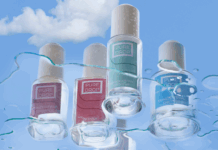A public communication campaign has just started on the social networks of the Pierre Fabre Group and its brands in order to publicize Conscious Care, "a unique approach to responsibility and innovation in the design, manufacture and social and environmental commitment of dermo-cosmetic and oral hygiene products."
In 2018, the Pierre Fabre Group's Dermo-Cosmetics & Personal Care division decided to overhaul its innovation strategy in order to develop products that are safer, more effective and more respectful of the planet. For the past three years, it has mobilized all of its businesses around this threefold objective to give substance to a radically new approach, based on a global consideration of its ecosystem and transparent and demonstrable commitments.
A product developed according to the Conscious Care approach must meet eight criteria: first of all, the tolerance and effectiveness of the product, to which are added the principle of "just necessary", the absence of undesirable substances, the eco-design of the formula, the eco-design of the packaging, the naturalness of the ingredients, their sustainable sourcing and finally the access to transparent information for the consumer.
"Conscious Care is a radically new vision of dermo-cosmetics that is not simply an exercise in cleaning up formulas. It allows us to obtain safer, more natural products, but also more efficient and more respectful of the environment and of the entire value chain. Conscious Care is therefore a much more holistic and ethical concept than clean beauty, which leads to an increased value proposition for consumers," says Xavier Ormancey, Pierre Fabre's Director of Dermo-Cosmetics & Personal Care R&D.
In order to be able to claim Conscious Care, a product must be eco-socially designed and therefore obtain a Green Impact Index of A or B. The Green Impact Index is a rating method created by Green Mission Pierre Fabre, validated and guaranteed by Afnor Certification, which allows to measure, improve and communicate with a simple letter (A, B, C or D) the environmental and societal impact of cosmetic and family health products. It is based on the transparent evaluation of 20 objective criteria such as: the biodegradability and naturalness of the formula, the carbon footprint of the packaging and manufacturing of the product, the water consumption, the geographical origin of the ingredients, the organic farming certification of the ingredients, the Guaranteed French Origin, the CSR commitments of the brand, etc.
In 2021, 56% of the new products launched by the Dermo-Cosmetics & Personal Care division of the Pierre Fabre Group met the 8 criteria of Conscious Care. Among them, the Tolerance Control range from Eau Thermale Avène, Biology from A-Derma, Neopur from René Furterer, Keracnyl Glycolic+ from Ducray and the blueberry range from Klorane. There will be 70% in 2022 and over 90% in 2023. At the same time, the products in the existing portfolio are gradually being reformulated to switch to Conscious Care according to a timetable that will be spread over a period of 6 years (2022-2028).
"Conscious Care is a fundamental movement, directly inspired by the Pierre Fabre Group's raison d'être: every time we take care of one person, we make the world a better place. All our brands have joined together to create Conscious Care, a breakthrough dermo-cosmetics that acts consciously towards its ecosystem to offer better care to consumers worldwide and drive a new turn in our industry", says Nuria Perez Cullell, General Manager Dermo Cosmetics & Personal Care Pierre Fabre.
The eight requirements of Conscious Care are:
- Tolerance & efficacy: developing products that meet the needs of patients and consumers while taking care of their sensory qualities to promote compliance.
- Zero undesirable ingredients: exclude ingredients that have not been scientifically proven to be beneficial and safe; continually seek alternatives to ingredients deemed undesirable.
- The right thing to do: go to the essentials by seeking the perfect balance between taking care of and minimizing the impact of the product; optimize the formulation to increase the effectiveness of the active ingredients tenfold while guaranteeing safety and pleasure of use.
- Naturalness: favouring ingredients of natural origin and more environmentally friendly manufacturing processes.
- Eco-designed formula: limit the impact of ingredients on the environment, guarantee their non-ecotoxicity and the biodegradability of rinsed products.
- Eco-friendly packaging: reducing the environmental impact of packaging.
- Sustainable sourcing: ensure traceable and sustainable supply of plants and raw materials, prioritizing short circuits and "Made in France".
- Transparency: communicate in a totally transparent way about the ingredients and their use.








